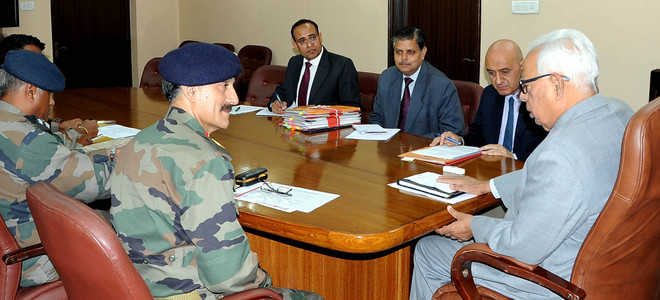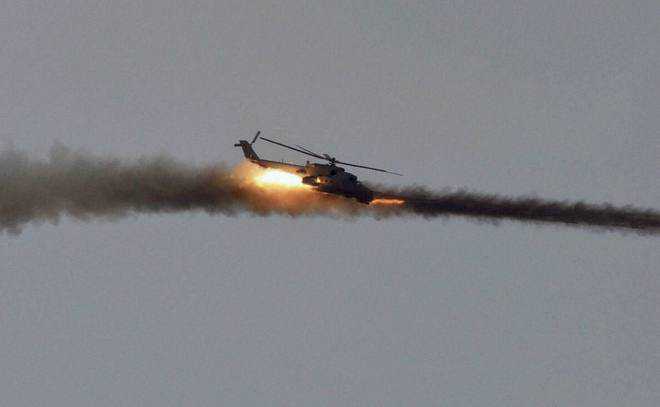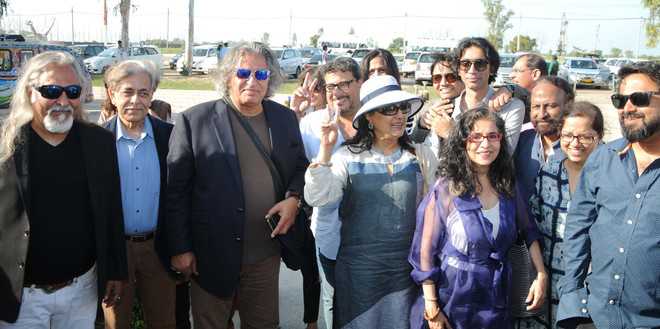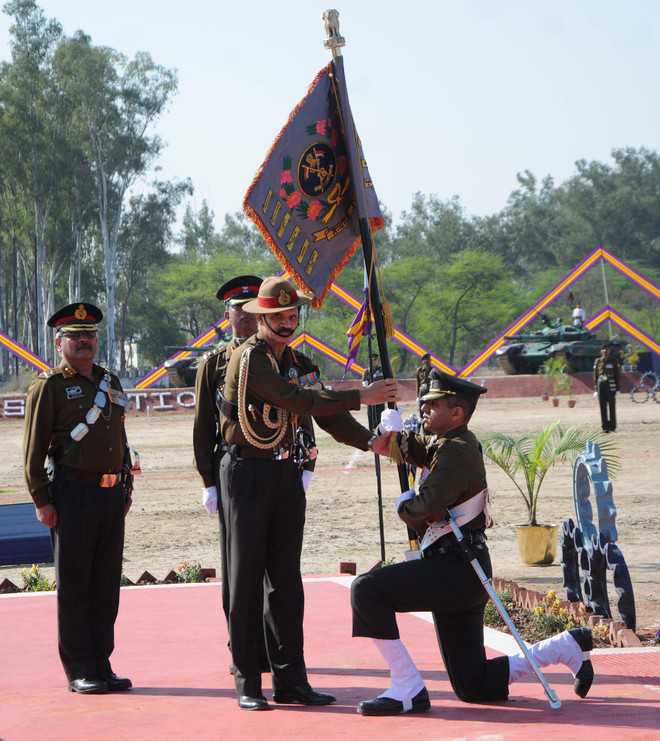 Governor NN Vohra holds a review meeting at the civil secretariat in Jammu on Tuesday. A Tribune Photo
Governor NN Vohra holds a review meeting at the civil secretariat in Jammu on Tuesday. A Tribune PhotoTribune News Service
Jammu, March 1
Governor NN Vohra today reviewed significant road projects being maintained and developed by the Border Roads Organisation (BRO) at a high-level meeting here.The meeting was attended by Parvez Dewan, Adviser to Governor; Lt Gen Suresh Kumar, Director General, BRO; PK Tripathi, Principal Secretary to Governor; Rohit Kansal, Commissioner PWD (R&B); and Brig Biswajit Bhattacharya, Chief Engineer, Sampark.The Governor was apprised of the status of maintenance and ongoing work on Jammu-Poonch national highway, Basohli-Bani-Bhaderwah road, Batote-Kishtwar road, Parimpora-Shalteng-Narbal part of NH1; and Baramulla-Rafiabad-Kupwara-Tangdhar road.The Governor observed that keeping in view the strategic and economic importance of NH-144A, the road from Akhnoor onwards which was under the control of the BRO was required to be developed to national highway standards by carrying out major improvements such as cross drainage works, surfacing and geometrics.The Governor directed expeditious upgrade of the Basohli-Bani-Bhaderwah road and other related improvements in order to make this road an effective alternative connection to Chenab Valley and onwards to Kashmir.Once completed, this road would provide an all-weather alternative corridor to the Chenab valley and for tourists and Amarnath pilgrims.He was informed that snow was being cleared near Simthan Pass and the nine-km road stretch from Achabal to Donipawa on the Batote-Kishtwar road was being widened. The Governor directed timely completion of snow clearance work to make the road trafficable well in time.The Governor directed that four-laning of the Parimpora-Shalteng-Narbal road sanctioned under Prime Minister’s Reconstruction Programme and development work on Srinagar-Sonamarg sector must be completed on priority.He reviewed the work of upgrade of the Srinagar-Uri-LoC road, double-laning of the Srinagar-Leh road via Kargil, Uri-Kamanpost road and Nimu-Padam-Darcha road. The Governor discussed the need to improve and widen the Mughal Road links from Bafliaz to Rajouri and to Surankote for encouraging traffic on this alternative route connecting Kashmir to the rest of the country.The status of maintenance and upgrade of roads in the border towns by Beacon and Sampark and various other important and critical roads maintained by the BRO were discussed in the meeting.He noted that feasibility studies undertaken by Beacon on Basti-Chattergala tunnel on Basohli-Bani-Bhaderwah road, Sadhana Pass tunnel on Kupwara-Karnah road and Razdan Pass tunnel on Bandipora-Gurez road.The Governor urged Dewan to fix timelines for land acquisition process on these important road projects and asked the DG, BRO, to direct all his officers to maintain close coordination with Commissioner, PWD.He reiterated his earlier directions that the Commissioner, PWD, should hold monthly review meeting to resolve all issues pertaining to land acquisition and other impediments in timely implementation of all national highway and other important road works.
Himalayan glaciers fragmenting: Expert
Tribune News Service
Dehradun, March 1
Dr Suraj Mal from the Department of Geography, Delhi University, today said, “Glaciers in the Bhilangana basin are fragmenting and resulting in the formation of glacial lakes. This is increasing the risk of floods due to glacial lake bursting.”Dr Mal was speaking at a workshop to present the results of a collaborative research project on hydropower irrigation nexus in the upper Ganga headwaters here today.Dr Mal’s study has revealed that there were 26 glaciers in the Bhilangana basin in 1968 and due to fragmentation, the number has increased to 30.He presented a data on recession and shrinking of the Khatling and Phating glaciers. The information presented has serious implications for development projects in the Bhilangana basin.The research project is a collaboration between the University of Arizona (USA), People’s Science Institute, Dehradun, Delhi University and ICIMOD, Kathmandu. It is funded by the water, land and ecosystems programme of the Consultative Group for International Agricultural Research (CGIAR).Mussoorie-educated Prof Chris Scott of the University of Arizonaspoke about the project, its objectives and shared results from hydro-meteorolgy analysis. He said there was a tremendous potential to enhance livelihood in mountain villages by using hydropower generated to lift river water for irrigation.Former Chief Secretary Dr RS Tolia called for integrating forest-hydrology linkages and understanding mountain geology and spring systems.Dr Ravi Chopra from the PSI said a grievance redressal mechanism was needed at the state level to respond to problems related to hydropower development in Uttarakhand raised by local communities.Vibha Puri Das, former FRDC, Uttarakhand Government, Ajay Verma, chief engineer (Garhwal), Department of Irrigation, P Jeyraj, PCCF (Planning and Management), Department of Forests, Bihari Lal from Lok Jeevan Vikas Bharti, Budha Kedar and Dr KN Vajpai of UNIDO also spoke at the workshop.











































































